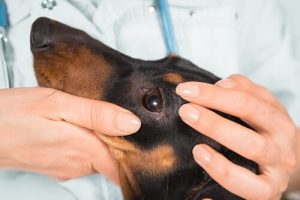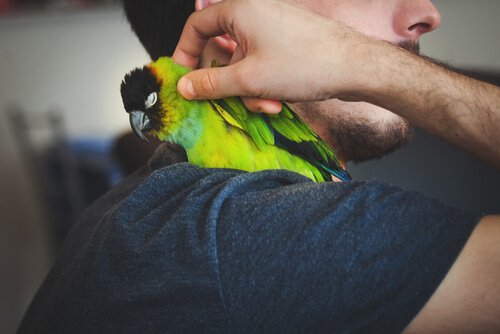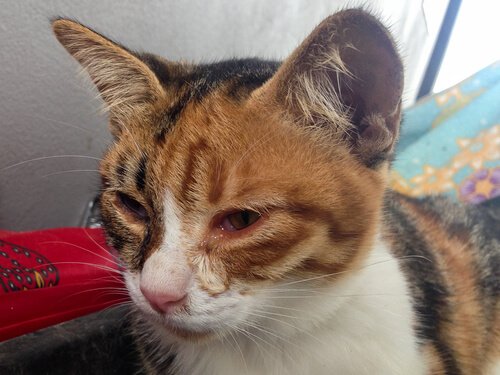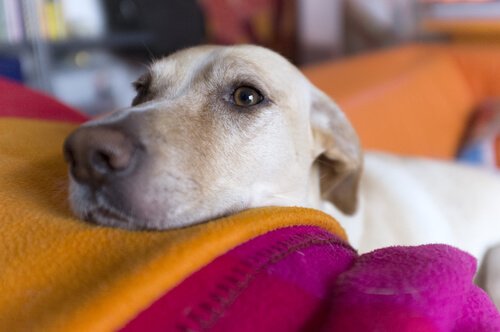Eye Exams for Animals


Written and verified by the lawyer Francisco María García
Animals can go to the “optician” as well. Conditions like conjunctivitis, cataracts, and glaucoma are just a few things that cats and dogs can have, which is why eye exams for animals are so important.
Eye exams for animals are now quite modern. Which is good because there are many animals that are prone to having vision problems, for example, the Dalmatians. Continue reading to get further information about eye exams for animals and why they’re so important.
What is an Eye Exam?
An ophthalmological exam is a name given to a group of tests used to detect eye problems. Basically, they check an animal’s vision and the condition of their eyes.
Vision can be tested by using light tests, hand movements, and the use of other objects. This way a vet can check if the animal is able to follow stimuli properly or if they’re losing sight.

As for the condition of their eyes, the vet will check for several things such as secretion from tears, examine the lenses, and intraocular pressure. As you can see, it’s quite an in-depth and detailed exam.
Detailed Eye Exams for Animals
Eye exams for animals are quite complex. They check for any problems with their eyelids, ptosis, trichiasis, blepharitis, neoplasias, etc. All of these can affect your animal’s vision and health.
The cornea is carefully examined for the presence of ulcers. Then, the eye cavity itself is examed to check the state of the iris, lens, cornea, and aqueous humour.
All of this depends on one important factor: proper care. Animals can have a variety of eye conditions and also are prone to injury. This is why eye exams for animals are particularly important and shouldn’t be ignored.
Reasons to Run an Eye Exam
Generally, vets will do routine check-ups any time you take your cat or dog in for an appointment. However, there are certain situations when you may want to go straight to the clinic for an ophthalmic exam.

For example, when you notice stains, inflammation, or any other odd appearance around your pet’s eyes, you should go straight to the vet. When your animal looks like it’s in pain or appears to be scratching this his eyes, don’t hesitate to get them checked.
Likewise, get them checked out is if you suspect your pet is having vision problems or injuries in or around the eyes. If you closely observe your animal every day, you can notice very quickly when something isn’t right.
Eye Injuries Are More Common Than You Think
Burns, bruises, prolapses, cornea problems, and injuries to the eyelids are common. These are all clinical problems that can happen to your pet at any time. Scratches from another cat or dog, contact with a stone or toxic substance, these all can cause an eye injury.
In case this happens to a dog, it’s a good idea to relieve the area with special eye drops for dogs. However, a proper examination by a vet is needed to assess the damage. There are many examples of pets whose eyes have been saved because of their owner’s checking their pet on regular basis.

Also, eye exams can also be useful for detecting other diseases, such as glaucoma in dogs, which can be a symptom of diabetes. Therefore, an eye exam may not just be helpful with your dog’s eyes, but also be beneficial for their overall health.
What to Do If You Think Your Pet Is Suffering from an Eye Injury
First, don’t apply any treatment yourself without first consulting with a vet. So, start by taking your pet to the vet and getting a thorough examination done first.
Another key aspect is prevention. Taking time to pay attention and observe your pet is really important if you want to solve problems early. One early sign of injury or illness is excessive weeping from the eyes.
One good form of prevention is hygiene. Amongst other things, you should be prepared to cut the fur above your pet’s eyes. Dirt and other things stick to their fur mean there’s a potential risk for both dogs and cats.
Animals can go to the “optician” as well. Conditions like conjunctivitis, cataracts, and glaucoma are just a few things that cats and dogs can have, which is why eye exams for animals are so important.
Eye exams for animals are now quite modern. Which is good because there are many animals that are prone to having vision problems, for example, the Dalmatians. Continue reading to get further information about eye exams for animals and why they’re so important.
What is an Eye Exam?
An ophthalmological exam is a name given to a group of tests used to detect eye problems. Basically, they check an animal’s vision and the condition of their eyes.
Vision can be tested by using light tests, hand movements, and the use of other objects. This way a vet can check if the animal is able to follow stimuli properly or if they’re losing sight.

As for the condition of their eyes, the vet will check for several things such as secretion from tears, examine the lenses, and intraocular pressure. As you can see, it’s quite an in-depth and detailed exam.
Detailed Eye Exams for Animals
Eye exams for animals are quite complex. They check for any problems with their eyelids, ptosis, trichiasis, blepharitis, neoplasias, etc. All of these can affect your animal’s vision and health.
The cornea is carefully examined for the presence of ulcers. Then, the eye cavity itself is examed to check the state of the iris, lens, cornea, and aqueous humour.
All of this depends on one important factor: proper care. Animals can have a variety of eye conditions and also are prone to injury. This is why eye exams for animals are particularly important and shouldn’t be ignored.
Reasons to Run an Eye Exam
Generally, vets will do routine check-ups any time you take your cat or dog in for an appointment. However, there are certain situations when you may want to go straight to the clinic for an ophthalmic exam.

For example, when you notice stains, inflammation, or any other odd appearance around your pet’s eyes, you should go straight to the vet. When your animal looks like it’s in pain or appears to be scratching this his eyes, don’t hesitate to get them checked.
Likewise, get them checked out is if you suspect your pet is having vision problems or injuries in or around the eyes. If you closely observe your animal every day, you can notice very quickly when something isn’t right.
Eye Injuries Are More Common Than You Think
Burns, bruises, prolapses, cornea problems, and injuries to the eyelids are common. These are all clinical problems that can happen to your pet at any time. Scratches from another cat or dog, contact with a stone or toxic substance, these all can cause an eye injury.
In case this happens to a dog, it’s a good idea to relieve the area with special eye drops for dogs. However, a proper examination by a vet is needed to assess the damage. There are many examples of pets whose eyes have been saved because of their owner’s checking their pet on regular basis.

Also, eye exams can also be useful for detecting other diseases, such as glaucoma in dogs, which can be a symptom of diabetes. Therefore, an eye exam may not just be helpful with your dog’s eyes, but also be beneficial for their overall health.
What to Do If You Think Your Pet Is Suffering from an Eye Injury
First, don’t apply any treatment yourself without first consulting with a vet. So, start by taking your pet to the vet and getting a thorough examination done first.
Another key aspect is prevention. Taking time to pay attention and observe your pet is really important if you want to solve problems early. One early sign of injury or illness is excessive weeping from the eyes.
One good form of prevention is hygiene. Amongst other things, you should be prepared to cut the fur above your pet’s eyes. Dirt and other things stick to their fur mean there’s a potential risk for both dogs and cats.
This text is provided for informational purposes only and does not replace consultation with a professional. If in doubt, consult your specialist.








